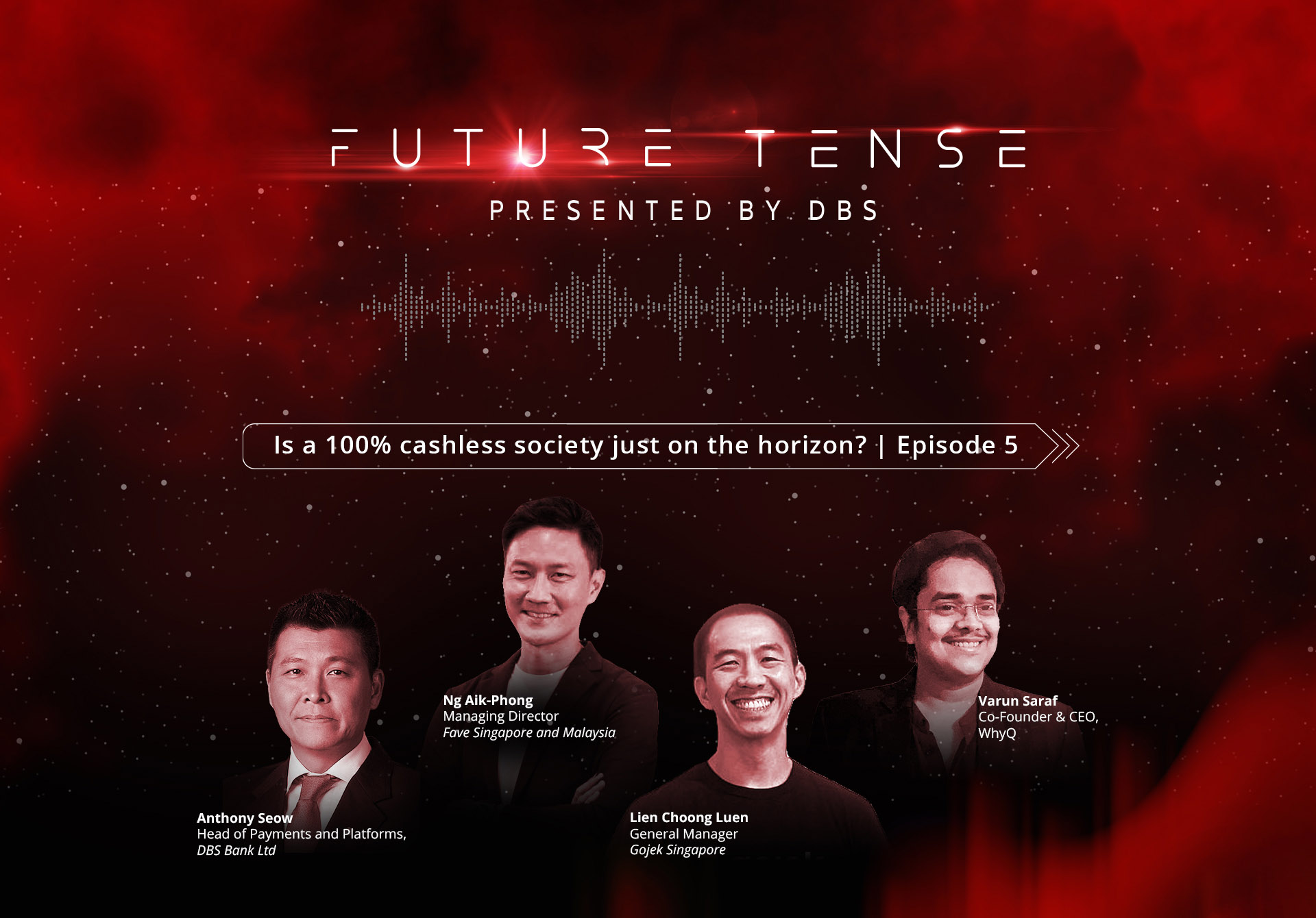Listen to this story
00:00
22:03
Subscribe to our podcast:
In brief:
-
We might be closer to a 100% cashless society than we think.
-
Covid-19 has given a boost to the use of digital payments. For instance, DBS Bank saw an acceleration in new sign-ups for its mobile wallet, DBS PayLah!, and increase in payments.
-
In the area of e-commerce and digital payments, we can expect more partnerships and multi-channel approaches as businesses seek to diversify their income.
-
Beyond just facilitating transactions, digital wallets and apps are part of an ecosystem, which other services can be layered on.
-
For some businesses, such as hawkers, digitialisation was a necessity due to Covid-19. But further education and guidance is needed to convince them to fully embrace going digital.
-
The new digital banking licences could help bring down the cost of transactions, which would be valuable to businesses and further the cashless drive.
Welcome to Future Tense, by DBS. We look at what's to come for Asia and the world as technology evolves at an accelerating pace. We get you comfortable with the future as business leaders tackle big questions about sustainability, innovation, fintech and more.
While the Covid-19 pandemic has had a devastating impact on many sectors, it has no doubt been a boon for e-commerce and digital payments.
With consumers staying home, sales on e-commerce platforms have skyrocketed. And even when consumers head out, more are opting for contactless forms of payment, instead of handling physical cash.
For instance, DBS Bank saw payments made via its DBS PayLah! mobile wallet increase by 40% in October this year, compared to a year ago.
Anthony Seow, DBS head of payments and platforms, elaborates.
Anthony: As DBS PayLah!, what we have built, put us in actually a very good position to be there when customer behaviour shifted during the pandemic, where they started getting more comfortable with being digital, in terms of e-commerce, making digital payments. So that actually helped us to grow our base to 1.8 million. And we are currently on track, based on a trajectory, to hit 3.5 million or beyond by 2023.
Because of the pandemic and what we have done so far, it accelerated new signs up for PayLah!. Signups in October 2020 was 40% more than a year ago. We are seeing payments increasing by 40%. This is basically people making P2P transfers or using it to make payments. Now, what's driving that is the more than 100% increase in P2B payments, meaning people are using it to pay merchants, pay bills. And what's very heartening also is that we are seeing average ticket size more than double.
So how can businesses ride this digital wave into 2021 and beyond? What are the opportunities not to be missed? And, the big question: is a 100% cashless society just on the horizon?
As part of its line-up for this year’s Singapore Fintech Festival, DBS hosted a panel discussion on the future of e-commerce with representatives from DBS Bank, lifestyle app Fave, super app Gojek and WhyQ, a hawker-first digital ecosystem. The panel was moderated by Jolyn Tan from Group Strategic Marketing and Communications at DBS.
Let’s hear from them.
Jolyn: A warm welcome, ladies and gentlemen, my name is Jolyn, and today we are live here in the DBS Sparks studio, joined by an esteemed panel of speakers. I have Anthony Seow, who is DBS head of payments and platforms. Beside him is Ng Aik-Phong, managing director of Fave Singapore and Malaysia. And we next have Lien (Lien Choong Luen), general manager of Gojek Singapore. Last but certainly not least, Varun Saraf, who is co-founder and CEO of WhyQ.
Let me kick this off with a very broad question. So in your view, where are new opportunities for innovation in areas of e-commerce and digital payments? So, for example, has the pandemic opened new areas of growth that were perhaps not so obvious previously? Perhaps I can have Fave start.
Aik-Phong: Fave as a company, we are a platform, we are a B2B2C platform. We serve about 30,000, 40,000 businesses. The pandemic actually has a V-shaped recovery for us.
During the early days of the pandemic, our business dropped close to about maybe about a third, but recovery has been tremendous and now we're actually surpassing our pre-covid days numbers.
The opportunities are very varied on a Fave platform, because we service different types of merchants, from the large MNCs to retailers to F&B merchants, to entertainment companies, et cetera.
The key thing going forward is a lot more partnerships and multi-channel approach to building your business. So, for example, we’ve partnered with big retailers, Pandora, BHG Welcia et cetera. A lot of them already have their own retail network, which is the stores. But that in itself, as we can see because of Covid-19, poses a challenge. You become very susceptible to big changes outside of your control and suddenly your business will plummet, even down to zero, when there is a forced lockdown. A lot of businesses that we service right now want to diversify their income. Essentially, they want to go online and this is where Fave can value add to them. At the same time, digitalise the solutions.
And when talking about digitalisation, it's really important because it's about saving costs. Food Republic is one of our big partners that accepts FavePay in all its outlets in Singapore as well as Food Junction, which is now part of Food Republic group. I was talking to one of the GMs recently. And he was saying, “Actually AP, I want to go 100% cashless.” So ok cool, we're there to help you.
And the reason why he said that is because whenever you manage cash, whether it's a hundred dollars per outlet or a thousand dollars, there's already cost there. I think there is a common enemy out there, which is cash. It's dirty and it's inefficient. So I think a lot of businesses really demand digitalisation services, and payments is really one of the bedrocks, the core.
We’ve still a lot more work to do, which is why going forward it’s really about collaboration.
It’s about creating equal partnerships with the likes of DBS, where together we can make the pie bigger.
The businesses that I talk to are very enlightened and very happy and I feel very positive because a lot of them are searching. They're not resting on their laurels. This is like a big wake up call for a lot of them. And they're just opening up and seeing what else they can do.
So with infusing a start-up culture with Fave, together with big companies up there, it can fuse our strengths and become the best of both worlds. That's where I think it can unlock a lot of opportunities and some of which are not even seen right now.
Some potential opportunities in terms of payments could be the Buy Now Pay Later trend. We see that quite a fair bit. There is a movement there. That could be a huge opportunity, I think, going forward.
And of course, as mentioned, digitalisation, omni-channel approach. The future is really interesting.
Jolyn: My next question is then a very natural segue way. So this is for Anthony. The circuit breaker has not been easy for most businesses like AP mentioned. In particular, the retail and F&B business have been hard hit. These merchants AP are talking about, are actually a similar group of lifestyle merchants that DBS PayLah! partners. So how have you supported the businesses as they get back on their feet?
Anthony: Through PayLah!, DBS is committed to supporting our merchant partners achieve economies of scale and boost their business. We are building new capabilities, putting intelligence onto the platform so they are able to provide nudges or provide information that's contextually relevant to the customers. We are creating new engagement tools to make it open to SMEs to self-help so they are able to create campaigns riding on our intelligence.
As a platform, we feel that certainly we have a lot to offer our partners and be able to help them with their business.
As an example, we have a very, very huge and active customer base. And how we have helped, is to leverage on that platform to communicate to the customer base.
We work with partners, for example, Daiso, Watson's, Soup Spoon and Sheng Siong. And by working with them on promotions and reaching out to our customer base, we were able to actually increase the value of transactions that my customers usually make prior to the campaign.
So we are actually getting numbers like a 50% increase from what they used to spend during the campaign. But what's interesting for us is after that post-campaign, when we continue monitoring, we were noticing that our customers were still spending 30% more with these partners than before the campaign.
A recent report by Google, Temasek Holdings and Bain & Co, forecasted online shopping in Southeast Asia to reach US$172 billion by 2025, compared to a previous US$153 billion estimate. Research findings also included an accelerated shift away from cash and increased trust in online transactions. As consumers get more comfortable with digital payments, how close are we to a 100% cashless society? And how do we get there?
Gojek Singapore’s Lien shares his views, followed by Ng Aik-Phong from Fave Singapore and Malaysia, Varun Saraf, co-founder and CEO of WhyQ, and Anthony Seow from DBS.
Lien: We talked a lot about payments and cash versus cashless, and obviously everyone's very concerned about paying cash.
Now, what has actually been interesting is that even though pre-covid, Singapore was already quite well penetrated in terms of e-wallets and credit cards, we still saw a 30% proportion of payments that were made in cash.
And after covid, I think that number has really increased, of digital payments being made. I’d love to have AP's aspiration of getting it to be 100% cashless, which is actually, after covid, it's not a pipe dream.
So maybe a year from now when we are sitting on this panel, maybe I'll be able to report that it is 100% (cashless) and hopefully a large proportion of that can be driven by DBS PayLah!.
Aik-Phong: Before this pandemic happened, a lot of us were probably thinking going totally cashless is like a pipe dream and never, ever going to happen. It's going to take maybe another, I don't know, 10 years.
Because of what's happening, that 30% is being chipped away and it's like maybe 20%, 10%, I think, very rapidly. This is a silver lining, and this is the biggest changer. Covid is the CFO that makes things happen.
Lien: But to add on, one thing is that previously we just saw credit cards as a means of cashless payment and it's just a transaction.
But if you look at how credit cards have actually layered on a lot more analytics and controls and guidelines and say, “you've got certain budgets for certain types of activities” – that backend value-added service – one of the things that the original people that started credit cards knew was that a credit card will incentivise spending because you don't feel the visceral pain of paying cash.
So now we've actually put in place safeguards for that. That's for credit cards. What is the same for a demographic that may be too young or not eligible for credit cards? And that's really where we see the value of PayLah!.
And you look at the PayLah! app, it is an ecosystem, it is not just a payment service, but it is a means to access many other services. Then whether you can layer on loyalty, you can layer on a much bigger pool, whether you can layer on some of these analytics or guidelines.
I think that's really where digital payment will go. It's not just a transaction, but because money is such a valuable asset and resource, we want to layer on a lot more services around it.
Aik-Phong: Digitalisation is great because you're going to create a lot more data. And this data is what merchants, retailers, partners can use to drive a lot more retention, repeats. So we have actually a lot of merchants on our platform requesting that: can they retarget the customers on our platform?
We are building apps and tools to enable our merchants to be able to retarget customers to self-service. We're actually doing very similar stuff to enable the platform to tap into the customers and that data would just open up a huge opportunity for all players.
Varun: Talking about the cash versus cashless space, we operate in a hawker space, which I think is probably one of the spaces which unfortunately has the most number of cash transactions today.
Let me start with a brief overview on WhyQ. We launched about three years ago with a mission to help our hawkers and deliver hawker food to consumers in a convenient and affordable manner.
WhyQ uses technology to help hawkers increase their revenue and also simplify their daily processes. We partner with more than 3,000 hawker stalls across 70 hawker centres in Singapore, and we currently deliver more than 3,000 meals a day to our consumers. Covid-19 did have an immense impact on our business. At WhyQ, Our team had to work extra hard to cope with a) the surge in demand from customers to get their food delivered and b) the need to onboard as many hawker stalls as possible onto our platform so that we could give them a digital sales channel.
WhyQ has created a digitalisation toolkit designed specifically for hawkers. As part of this toolkit, hawkers can create their own individually branded e-menus; it allows hawkers to use a POS system to record their transactions and also manage their basic accounts and view sales and customer analytics, which they could never do before. We have a range of automated marketing tools, which include setting up a social media page for hawkers and allowing hawkers to reach out to their customers through digital channels.
We are very glad that we could onboard an additional 1,000 hawkers during the circuit breaker period.
What we've seen is that while there is a myriad of payment solutions available for customers, even at hawkers, the merchants are not really able to understand, because they are older generation aunties and uncles. They're not able to really understand the benefits of this because they work in a very cash-driven manner.
And that's where we feel that we can basically jump in and provide this layer that we can connect to the hawker and also the hawker can see a verification of the payment that is made at the hawker stall because that is something they can't see right now.
And for them, cash is very physical. It's in the hand. They can see it. But for a QR code payment, that's not something that they can see immediately.
So that's one of the angles that WhyQ is working on to create that part of the ecosystem and also create e-learning platform for the hawkers and hold seminars and educate them on the benefits of digitalisation and actually go on the ground and educate them on how things work, how they can set up online pages, Facebook pages, what the benefits of digitalisation are.
Because while covid has made it necessary for them to look at this (digitalisation), they're still not convinced of how to actually get there.
Anthony: I'm very heartened in the sense that we are all very aligned in terms of where we think things are going to evolve and where the opportunities are.
DBS PayLah! – there's another thing that we're working very, very hard on from the intelligence perspective and being contextual and putting ourselves into the customer journey.
So let me give an example: you look at PayLah! today, you can book a Golden Village ticket. Let's say, you just book to watch a movie at Vivocity at 12pm. So, I know you're going to Vivocity to watch a movie. And I'll say, “do you need a ride from Gojek”. Through our connectivity on the platform, we are able to help you book and you just say “yes”. Once you get to Vivocity, I know you like Subway and it's a FavePay merchant and you have cash rebates sitting there. “Hey, guess what, you have $5, would you like a Subway?” Just to remind you, something contextual, and then after that again, I can kind of tell that you've booked Gojek to go home. “Well, it's dinner time, do you feel like takeout from WhyQ?”
We see DBS PayLah! in a very unique position to string all our partners together and really fit ourselves into the customer journey. That's the huge opportunity – that by going cashless and digital, it provides us the opportunity to help merchant partners get into that journey.
And ultimately, the consumers are happy because it's such a nice, seamless journey. They get their benefits. They're happy. My partners are happy. My merchant customers are happy. DBS being PayLah! will be extremely happy because everybody is win, win, win. I think that’s really where the opportunity is.
Jolyn: Very interesting stuff there. I do want to pick up on a point that Varun mentioned. My question is actually, how has a pandemic induced growth affected your expansion plans in Singapore and across the region? So I hear that you intend to expand into Malaysia next, for example. Can you give us a little bit more into that?
Varun: On the hawker side, it's actually accelerated our expansion significantly because you've seen so many more vendors come to us, approach us and want to get onto our platform.
What is also changing our outlook is that we need to move faster and at least roll out a digitalisation solution across in other markets like Malaysia, because even if we don't roll out the food delivery aspect, which other services are already doing, we feel that this ecosystem that we have created the operating system for – this small F&B space – is something that we can actually take to other markets as well.
And that's what we want to launch in markets like Malaysia. Because in Malaysia, you also get the angle, which I think is not as present in Singapore, of basically a lot of the vendors are working on credit, which does not happen as much here.
So by creating a digital log of their transactions – if they're actually able to use a POS system and create that digital log of transactions – then that opens up an entire angle of financing for these vendors as well, which is something that can be very interesting for us in other markets outside of Singapore.
Jolyn: The second part of my question to every one of my panel: how has Covid-19 attracted new investors or even corporate partnerships that might have been a little bit harder to get previously?
Lien: For Gojek, we recently raised another $150 million from Telkomsel in Indonesia to help drive the digital economy. So these are very natural partners. If you look at recent rounds, we had Facebook and Google. And why would they partner with Gojek is because it's still their nexus of online, the digital to physical fulfilment.
But I'd love to jump in here on a little point. The topic was really around broader business expansion. But what we've seen post-covid is there has also been a change in consumer behaviour. And I think it plays very well in both WhyQ and, you talked about, digitalisation of the heartlands.
We've seen a lot more local travel now, which means that if you're not going to the office, you still want to meet people. Face-to-face interaction is still very valuable. We see a rise of the third place, much more local travel. And if you're going to take a long trip, say to the office, it makes sense – you wait maybe five, 10 minutes for a bus or take the public transport.
But if it's a short distance trip – Our trip distances have come down slightly because many people are traveling locally, meeting locally, going to the coffee shop locally, or maybe going to the hawker centre locally.
And with this change in the patterns of behaviour, then point-to-point makes much more sense, because for a 10-minute ride, you don't want to wait 10 minutes. You might as well just have a ride come to your door.
So there are many of these smaller shifts that will play out in terms of the consumer that will also collectively be a very large opportunity in terms of digitalisation and change in the future.
The theme is around 2021. And I think this is one of the aspirations that we see for 2021. Short trips, short rides, you know, much more local and much more digital.
During this discussion, our guests also shared their views on the new digital bank licences that would be awarded in a move to liberalise Singapore’s financial industry.
The Monetary Authority of Singapore (MAS) has since announced the companies that would receive theses licences.
Jolyn: OK, so on that note, I have my finale question, and this would be open to the floor. Some of your biggest fintech competitors may soon be awarded digital banking licences. How have you taken this into account in your business plans or roadmap?
Anthony: Basically for us at DBS, we have been preparing for this for a very long time. You can go quite a number of years back where Alipay first started and then we started seeing WePay. We really realised that threat of fintech to the banking space is real. So since then, we have done a lot of things in terms of getting ourselves ready – from the way we're looking at our systems, digitising processes. Like credit cards today, for example, 100% or at least 90% is actually digitally applied. Once you digitise things there's actually opportunity, like I said, to improve customer journey et cetera.
We also reorganised the way we worked to be like a fintech actually. At one time, my Group CEO was referring to us as a 27,000 start-up. So we organise the way we work, we change the way we work. For example, adopting agile methodology where you come with a minimum viable product and iterate once you get it on the market and iterate from then on. We've been working hard and preparing. To us, competition is good, it keeps us on our toes. I would say we are ready for it.
Aik-Phong: For Fave, I'm actually really excited. I think for payments, one concern is always about the cost of money, your cost of funds. When you open up the banking licence, the individual who actually gets the licence will be able to kind of dramatically reduce that. And ultimately, the beneficiaries would be the merchants who are in the platform as well as consumers. So I think the future bods well for Fave.
Lien: We're here to reduce lives' daily frictions. And so whoever makes it more convenient for our customers and our riders, obviously are people that we love to partner with. That's why we work with DBS.
AP talked about the cost of capital. I think there's also the cost of transaction. And in an open and contested space, then if the cost of transactions come down, that's also something that's very, very valuable for us. In total, there are, I think, 12 million trips, not just point-to-point, but including public transport. That's a lot of transactions of quite a high value. And if the frictional cost comes down, then it's really better for the whole system.
Varun:
I think definitely bringing this cost of transaction down is essential in getting rid of cash because cash, at least to the merchants we work with, they view it as having no additional cost.
And then again, like I was saying earlier, it's about getting them to actually trust that, because I think a lot of the smaller vendors, they don't trust digital payments fully.
So it's about building up that trust in their eyes, that this is as good as cash for you. It can be withdrawn any time because it's a wallet. It's not something that will take, two or three days to get to you. And basically, in their eyes, it should be an equivalent of cash. And that's when I think this actually succeeds.
How ready are you for a fully digital ecosystem for payments? As more move towards cashless systems, the opportunities for customers, merchants and ecosystem partners will give rise to new customer journeys, experiences and even lives.
We hope you enjoyed this episode of Future Tense by DBS.
Subscribe now to keep up to date with all future episodes.





